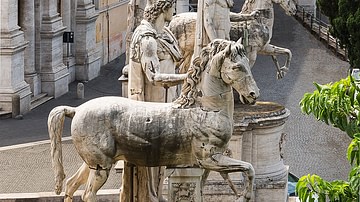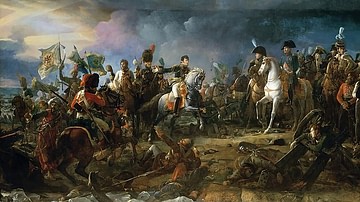Search
Did you mean: Avars?
Search Results

Definition
Harold Godwinson
Harold Godwinson (also spelt Godwineson) reigned briefly as King Harold II of England from January to October 1066 CE, the momentous year which witnessed the Norman conquest and end of 500 years of Anglo-Saxon rule. Harold had been, as the...

Definition
Battle of the Granicus
The Battle of the Granicus in May 334 BCE was Alexander the Great's (356-323 BCE) first major victory against the forces of the Achaemenid Empire. Alexander had crossed the Hellespont with his combined Macedonian and Greek forces and stepped...

Definition
Miltiades
Miltiades (c. 555-489 BCE) was the Athenian general who defeated the Persians at the Battle of Marathon in 490 BCE. The Greeks faced a Persian force of superior numbers led by the commanding admiral Datis, who had been sent by their king...

Definition
First Anglo-Sikh War
The First Anglo-Sikh War (1845-6) was a short and bloody conflict won by the British East India Company (EIC) against the Sikh Empire. The EIC was keen to expand into northern India, but the Sikh army was a well-trained, well-equipped, and...

Definition
Epaminondas
Epaminondas (or Epameinondas, c. 420 - 362 BCE) was a Theban general who famously defeated Sparta at the Battle of Leuctra in 371 BCE. The daring and brilliant pre-meditated tactics of Epaminondas earned a decisive victory over Sparta and...

Definition
Castor and Pollux
Castor and Pollux (the Dioscuri) are figures from Greek and Roman mythology considered the twin sons of Zeus or Jupiter. Semi-divine figures, the twins were credited with the role of saving those in trouble at sea or in grave danger in war...

Article
Weapons of the Conquistadors
The Iberian conquistadors ("conquerors") were the first military men to explore, attack, and conquer territories in the Americas and Asia that would then become a part of the Spanish or Portuguese Empire. Indigenous peoples could not match...

Article
Battle of Austerlitz
The Battle of Austerlitz (2 December 1805), or the Battle of the Three Emperors, was one of the most significant battles of the Napoleonic Wars (1803-1815). It saw French Emperor Napoleon I (r. 1804-1814; 1815) and his Grande Armée decisively...

Article
Battle of Friedland
The Battle of Friedland (14 June 1807) was a decisive battle of the Napoleonic Wars (1803-1815), fought by the armies of the French and Russian empires. A major French victory, Friedland caused the Russians to sue for peace, resulting in...

Article
Battle of Crécy
The Battle of Crécy on 26 August 1346 CE saw an English army defeat a much larger French force in the first great battle of the Hundred Years' War (1337-1453 CE). Edward III of England (r. 1327-1377 CE) and his son Edward the Black Prince...